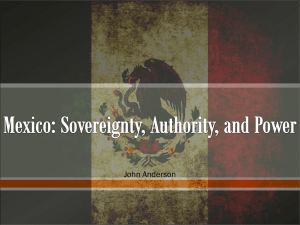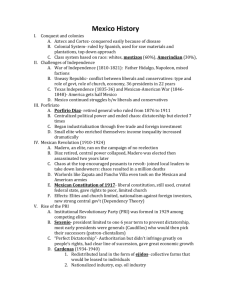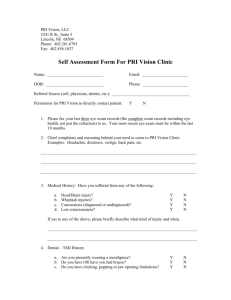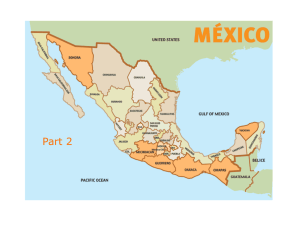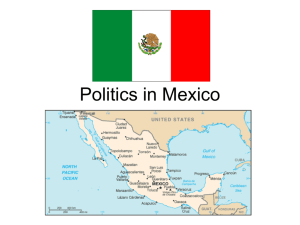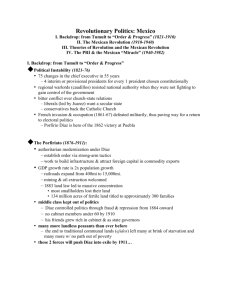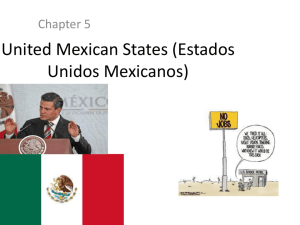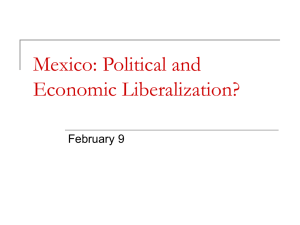The Mexican Political System
advertisement
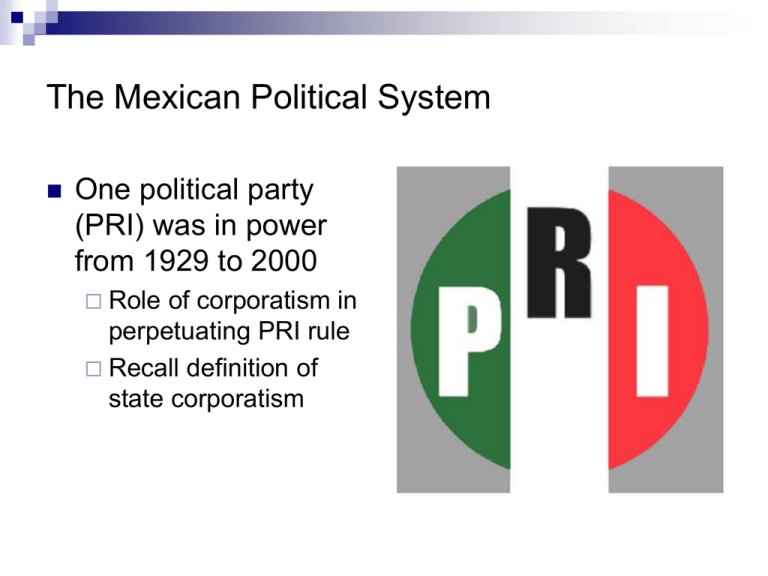
The Mexican Political System One political party (PRI) was in power from 1929 to 2000 Role of corporatism in perpetuating PRI rule Recall definition of state corporatism The Mexican Political System One political party (PRI) was in power from 1929 to 2000 Role of corporatism in perpetuating PRI rule Definition of state corporatism a system of interest representation in which certain groups are officially recognized by the state in exchange for acceptance of state control or limits on their expression of interest and demands In contrast to pluralism a system of interest representation in which groups can freely form to press their interests without limitation Mexican Political System--Corporatism Corporatist organizations under the PRI Organizations Confederation of Mexican Workers National Peasant Confederation National Confederation of Popular Organizations Mexican Political System--Corporatism Corporatist organizations under the PRI Example: Confederation of Mexican Workers Recognized by PRI; independent unions repressed Agreed to limit demands Limits on wage increases, limits on grievance procedures, limits on right to strike Leaders of official federations rewarded by PRI 1980s-90s: 14-22% of Congress: Confed. of Mex. Workers Mexican Political System--Corporatism Government Used control over union registration to deny independent unions permission to organize Stood by while businesses fired workers trying to establish independent unions Mexico Labor Case Grows For Maker of Barbie Gowns Monday, June 12, 2005 There was not much that Guadalupe Ávila Jiménez liked about her factory job making children's costumes, including flowing Barbie gowns for little girls who like to play princess. ''They shouted at us, they did not let us go to the bathroom, they gave us food that made us vomit,'' said Ms. Ávila, 21, reciting a litany of indignities she said she had suffered at the factory, in Tepeji del Río. About the only thing she did like were the costumes the workers made. ''What we made was really pretty,'' she said. Mexico Labor Case Grows For Maker of Barbie Gowns Monday, June 12, 2005 Today the factory is facing a labor dispute that is anything but pretty. What started out as a local struggle may now shift its focus to the American toy giant Mattel, which licenses the Barbie label to the plant's owner, Rubie's Costume Company, based in Richmond Hill, Queens. Unlike other toy companies, Mattel has an eight-year-old code of conduct for subcontractors and licensees. Saying they were fed up with managers who called them names, closed factory doors to force overtime and required them to buy work equipment and even toilet paper, Ms. Ávila and 60 co-workers -- most young women, some as young as 15 -- voted for a new union. In April, they say, they were locked out and lost jobs that paid little more than $5 a day. Mexican Political System Role of patron-client relations PRI politicians as patrons Demanded votes Provided access to government resources Workers, peasants as clients Voted for PRI in exchange for resources Examples Workers Subsidized housing, healthcare Peasants Ag price supports, special credit programs for farmers Mexican Political System Breakdown of patron-client relations Economic crises in 1980s & 90s Instituted wage freezes for Confederation workers Abolished price supports for agricultural products Ended special credit programs for farmers Mexican Political System Breakdown of corporatism Exclusion of many from the corporatist system: the informal sector “Battles in the Desert” Nature of state-society relations during PRI Rule “Battles in the Desert” Nature of inequality Examples of foreign domination Role of political corruption Which theoretical perspective best reflects the themes of the story? Nature of state-society relations during PRI Rule “Battles in the Desert” Nature of inequality Note relationship to (low) interpersonal trust Examples of foreign domination Role of political corruption Interpersonal trust, World Values Survey, 2005 Others can be trusted Can’t be too careful Nature of state-society relations during PRI Rule “Battles in the Desert” How much change today? Informal sector 57% of non-farm employment 44% of urban jobs, low education, no safety net PRD, Obrador candidacy in 2006 Mexican Political System authoritarian or democratic? authoritarian aspects through late 1990s strong president from single dominant party (8) control over elections “rubber stamp” legislature democratic aspects regular change of leadership via elections “Democraticness,” World Values Survey, 2005 Not at all democratic Completely democratic Mexican Political System System on paper Direct presidential elections Legislative elections Chamber of Deputies (500 seats) 300 by “first-past-thepost” in single member electoral districts 200 by proportional representation Senate (128 seats) 4 deputies elected from each of 31 states and capital Mexican Political System System on paper Direct presidential elections Legislative elections Actual functioning through 2000 Electoral fraud and corruption undermined democratic functions Mexican Political System Political parties PRI (Institutional Revolutionary Party) 1929 Corporatist relationship with workers, peasants PAN (National Action Party) 1939 Right of center Socially conservative Business interests PRD (Democratic Revolutionary Party) Left of center Cardenas splits from PRI 1988 Voting in Presidential Elections, 1934-2000 PRI (%) PAN (%) PRD (%) 1934 98.2 1940 93.9 1946 77.9 1952 74.3 7.8 1958 90.4 9.4 1964 88.8 11.1 1970 83.3 13.9 1976 93.6 n/a 1982 71 15.7 1988 50.7 16.8 1994 50.1 26.7 2000 36.9 43.4 2006 22.3 35.9 35.3 Other (%) 1.8 6.1 22.1 17.9 0.2 0.1 1.4 1.2 9.4 32.5 23.2 19.7 4.4 Invalid Turnout 53.6 57.5 42.6 57.9 49.4 54.1 63.9 29.6 66.1 49.4 77.2 63.8 2.2 41 Chamber of Deputies (seats) 1994 1997 2000 2003 2006 PRI 300 239 209 222 122 PAN 119 122 205 151 206 PRD 71 125 50 96 159 Other 13 Senate (seats: note half elected each time) 1994 1997 2000 PRI 64 77 60 39 PAN 26 33 46 52 PRD 8 16 15 36 Other 2003 2006 1 Mexican Political System Building democracy Increasingly democratic reforms pushed by President Zedillo (1994-2000) Federal Electoral Institute Benefit programs NOT tied to vote for PRI Mexico, Voting In New Leader, Begins Political Sea Change, July 4, 2000 "All the parties are going to have to relearn the art of making politics," said Carlos Elizondo Mayer-Serra, a political scientist. "The fundamental pillars of Mexico's political system have changed." Voting in Presidential Elections, 1934-2000 PRI (%) PAN (%) PRD (%) 1934 98.2 1940 93.9 1946 77.9 1952 74.3 7.8 1958 90.4 9.4 1964 88.8 11.1 1970 83.3 13.9 1976 93.6 n/a 1982 71 15.7 1988 50.7 16.8 1994 50.1 26.7 2000 36.9 43.4 2006 22.3 35.9 35.3 Other (%) 1.8 6.1 22.1 17.9 0.2 0.1 1.4 1.2 9.4 32.5 23.2 19.7 4.4 Invalid Turnout 53.6 57.5 42.6 57.9 49.4 54.1 63.9 29.6 66.1 49.4 77.2 63.8 2.2 41 Mexican Political System Consolidating democracy Election of opposition candidates 2000 Vincente Fox’s (PAN) “yuppie revolution” 2006 Calderon’s (PAN) narrow victory <1% of vote over Obrador (PRD) charges of vote fraud low voter turnout ~40% Test of democratic institutions EU observers: “transparent and competitive” Federal Electoral Tribunal upholds election With no representation by PRD Felipe Calderon Battle for Mexico's democratic soul (2006) By Franc Contreras BBC News, MexicoCity Politics has often been a violent affair in Mexico. And after decades of virtual one-party rule, July's parliamentary election has caused bitter recrimination. Mexicans have a lack of trust in their political institutions Mexican Political System Drug war Impact on political system
